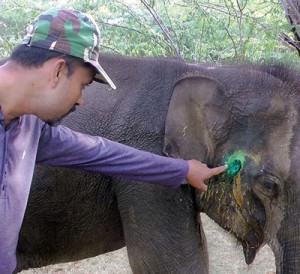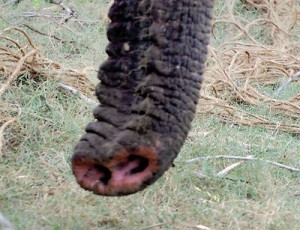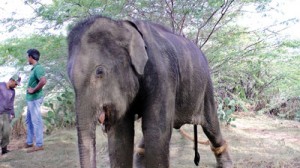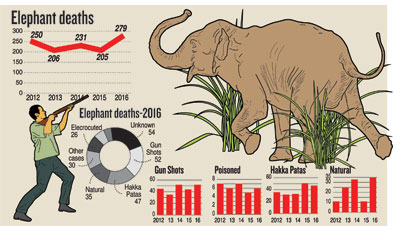News
Explosives killing hundreds of elephants, protection handicapped
A four-year-old elephant, which had suffered severe injuries after biting an explosives-packed device used to hunt wild animals for human consumption is fighting for its life.
The illegal device commonly known as —‘hakka pattas’ — a mixture of explosives with lead and ball bearings inserted into a piece of pumpkin had been placed in a location in Hambantota. It is at that site where the wounded animal had been found nearly two weeks after the incident.
The explosion had mutilated its jaw bones, teeth, and ripped off a foot long piece of trunk. The animal is being treated at the Elephant Transit Home Udawalawe.
Veterinary surgeon, Dr Malaka Abeywardena told the Sunday Times that even after three days of treatment, there had not been any improvement as of Friday.
“Due to the damage to the jaw and teeth of the elephant calf it has to take liquid food. It is malnourished and weak making anaesthetised surgery impossible.’’
Dr Abeywardena said that that the calf would have roamed near Hambantota harbour for over a week after being wounded. The animal’s mouth and the side of it’s head was infested with maggots.
“Antibiotics are given twice a day, while saline, energy boosting medicine and vitamins are given regularly,’’ he said.
Incidents of elephants being killed by using hakka patas, shooting them or poisoning them are on the rise.
Within the last five years, from 2012 to 2016 around 1,171 elephants have died out of which only 104 had died due to natural causes, according to the Wildlife Department.
The survey on the elephant population done in 2011 revealed that the number of elephants in the country around 5,800.
Statistics show that during last year alone 279 elephants were found dead and only 35 of them had died due to natural causes.
Dr Tharaka Prasad, director of wildlife health at the Wildlife Department as well as the chief veterinary surgeon, said more deaths take place because of gun shot wounds.
He said that a tusker and another elephant suffering from gunshot injuries are struggling for their lives in Kala Wewa, Anuradhapura and in Minneriya respectively.
“Elephants which are shot can only be identified when the animal shows signs of weakness or seen limping towards a pool of water. Its too late then as it is badly infected by that time,’’ he said.
Dr Prasad noted instances of elephants wounded by trap guns set up by farmers and surviving for years after the wounds heal, but the corrosion of the iron balls embedded in their flesh, kills them eventually.
He explained that some farmers kill elephants by using toxic pesticide in vegetables. Electric fences can also kill elephants in minutes or within days.

The explosion had mutilated the baby elephant's jaw bones, teeth, and ripped off a foot long piece of trunk. Pix by Rahul Samantha Hettiararchchi
“At least three elephants are found dead every week. If an animal that has been poisoned, eaten hakka patas, or has suffered burn injuries from an electrical source, is found alive, there is little chance to save it,’’ he explained.
There are 15 wildlife veterinary surgeons, but their main task is to handle any epidemic situation in wildlife parks and not individual cases.
Meanwhile, wildlife rangers, guards and officials from various parks spelt out the difficulties that they face in elephant conservation. There is not enough staff for monitoring, for raids, to investigate those who set explosives, or those who leave poisoned food in the paddy fields bordering forests.
There is also not water in Galagmuwa, Giribawa, Hambantota, and Meegalawa because of the drought. Water is brought in by tanker trucks only into some areas.
“The elephants which roam in search of water take down electric fencing and enter villages.The villagers shot them,’’one of them said.
The lack of staff means they have to call up the unarmed Civil Defence Force to help. They are not trained to handle wildlife issues.
The rangers also claimed that some elephants are wounded by their own officers because they use live ammunition, not rubber bullets.
Director general of the DWC, M G C Sooriyabandara, said that over 65% of elephant deaths are caused by shooting.
Elephants who fall victim to hakka pattas could suffer for over three months and starve to death.
Mr Sooriyabandara said that use of hakka pattas within or outside of wildlife reserves is illegal, but detection is difficult.
“According to the Fauna and Flora Protection Ordinance any person who kills or harms any protected animal is liable to a jail term and or a fine of Rs 200,000 to Rs 500,000.
Mr Sooriyabandara admitted that the DWC is short staffed, but said offenders can be arrested.
He denied that live ammunition is used and explained that rubber bullets are provided to officers for emergencies.
“We never encourage officers to shoot animals. We never provide live ammunition, but if individuals are using them we will investigate.’’
Minister of Sustainable Development and Wildlife, Gamini Jayawickrama Perera, said he wants to find the companies making firecrackers that provide people with gunpowder to produce hakka pattas.
If animals continued to suffer, new laws will have to be drafted to restrict gunpowder issued to villagers, he said.
Mr Perera said that the department needs at least 1,000 officials. He had informed the cabinet that 200 people are urgently needed.


